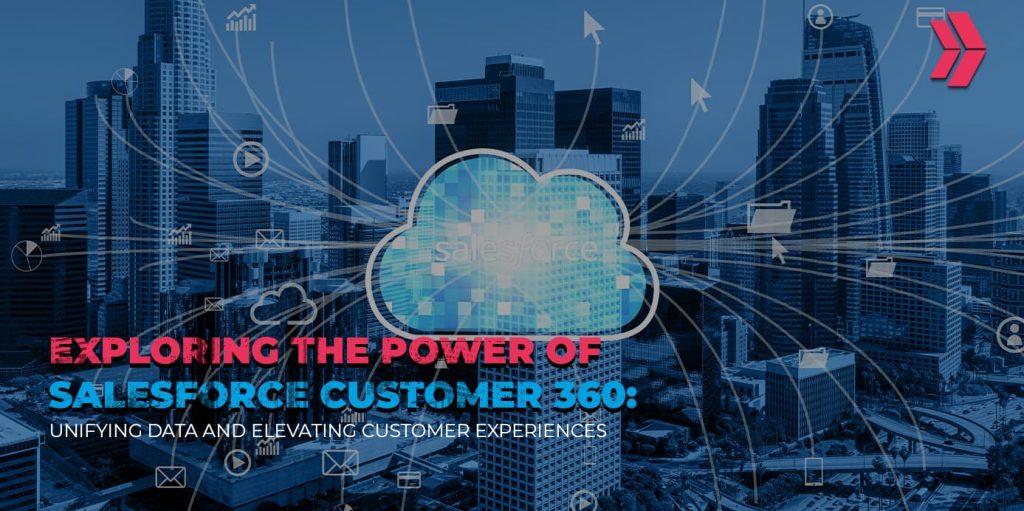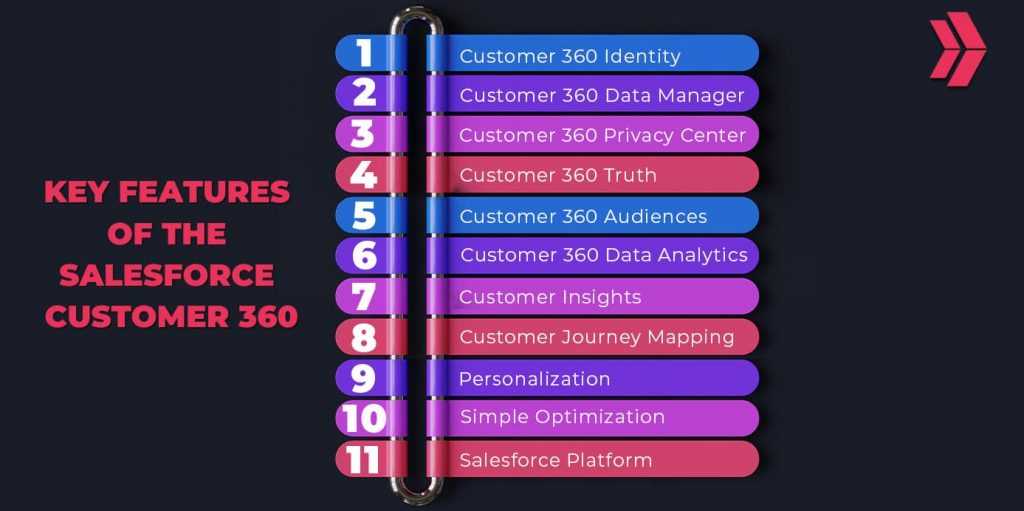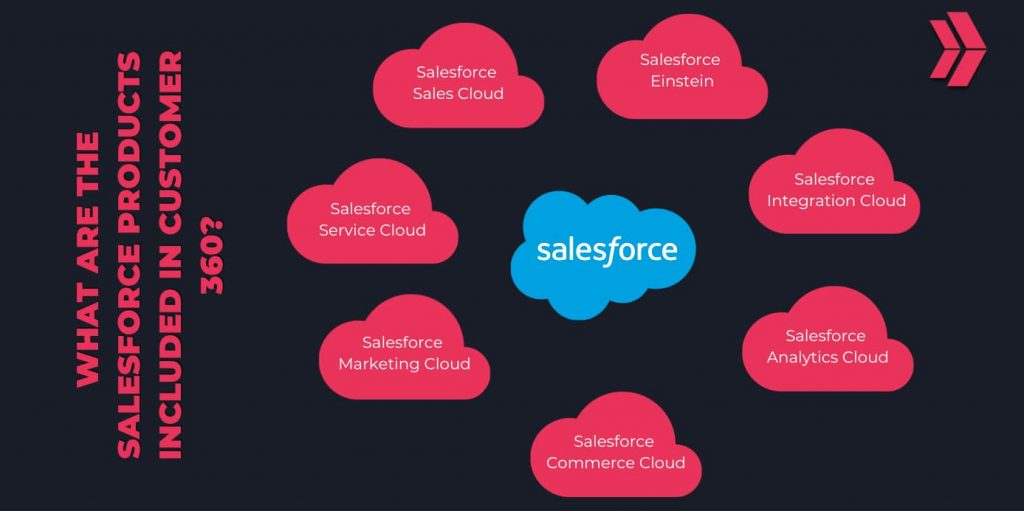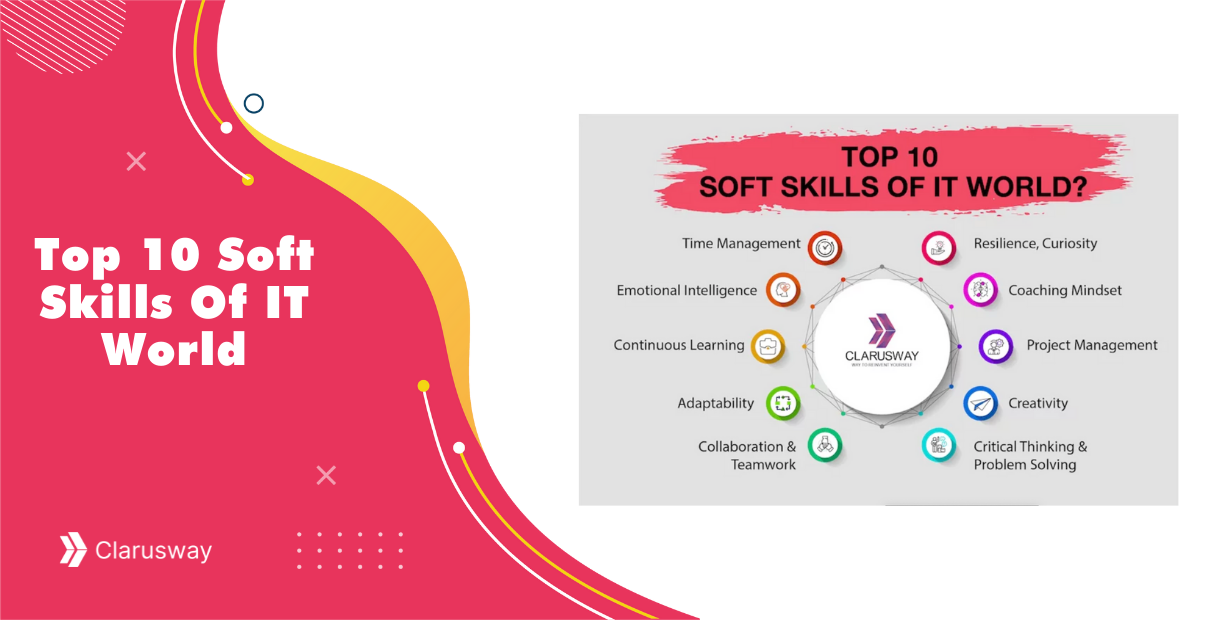Salesforce Customer 360 emerges as a powerful tool that empowers businesses to achieve just that by unifying data and elevating customer experiences. 85% of customers expect consistent interactions across departments, according to our State of the Connected Customer report. However, 60% of respondents say they communicate with different departments rather than one company. Besides, organizations seek comprehensive solutions to manage customer data and gain insights that drive personalized experiences.
In this blog, we will learn about what is the Salesfroce Customer 360, its key features, benefits, limitations, and ways to learn to use Salesforce Customer 360 effectively.

What is Salesforce Customer 360?
Salesforce Customer 360 is a platform designed to create a holistic view of customers by integrating data from multiple sources. It provides a unified profile for each customer, offering a deeper understanding of their preferences, behaviors, and interactions.
Salesforce Customer 360 breaks down data silos, enabling businesses to deliver more personalized and consistent experiences across various touchpoints. To learn more about “What is Salesforce?”, you can read the detailed post about the topic.
What Are the Key Features of the Salesforce Customer 360 Platform?
Here are the features of Salesforce Customer 360:
- Customer 360 Identity,
- Customer 360 Data Manager,
- Customer 360 Privacy Center,
- Customer 360 Truth,
- Customer 360 Audiences,
- Customer 360 Data Analytics,
- Customer Insights,
- Customer Journey Mapping,
- Personalization,
- Simple Optimization (Einstein AI),
- Salesforce Platform.

Customer 360 Identity
Salesforce Customer 360 Identity is a component of Salesforce’s Customer 360 platform focused on identity and access management. Customer 360 Identity creates a unified identity for each customer by consolidating data from various sources. It is a pivotal component of the Salesforce Customer 360 platform. This unified identity allows businesses to comprehensively understand their customers’ interactions, preferences, and behaviors. With Customer 360 Identity, organizations can create more targeted and personalized engagement strategies, improving customer satisfaction and loyalty.
Customer 360 Data Manager
Salesforce Customer 360 Data Manager is a feature within the Salesforce Customer 360 platform that focuses on managing and integrating customer data. Customer 360 Data Manager enables businesses to overcome data silos by consolidating information from disparate sources. It plays a crucial role in the seamless integration and management of customer data. This ensures customer data remains accurate, up-to-date, and consistent across all systems. Therefore, organizations can make informed decisions, offer personalized experiences, and enhance overall operational efficiency by maintaining a unified and accurate data repository.
Customer 360 Privacy Center
Salesforce Customer 360 Privacy Center is a specialized component within the Salesforce Customer 360 platform dedicated to helping organizations manage and comply with data privacy regulations and customer data protection requirements.
Customer 360 Privacy Center allows organizations to adhere to data protection regulations by providing robust tools for managing customer data privacy. It ensures that customer data usage and communication preferences are respected, fostering trust and compliance with legal requirements.
Customer 360 Truth
Salesforce Customer 360 Truth is a powerful data management and integration tool within the Salesforce Customer 360 platform. Customer 360 Truth focuses on creating a single source of truth by unifying and synchronizing data across various systems and touchpoints. This unified data model ensures that businesses have accurate, up-to-date, and consistent customer information. As a result, organizations can make data-driven decisions, deliver personalized experiences, and build stronger customer relationships.
Customer 360 Audiences
Salesforce Customer 360 Audiences is a feature within the Salesforce Customer 360 platform that focuses on creating and managing customer segments for targeted marketing and engagement campaigns. Organizations can create more effective and personalized marketing campaigns by categorizing customers based on shared characteristics, behaviors, or preferences. This feature empowers marketers to tailor their messaging, promotions, and content to resonate with each audience segment, leading to higher engagement and conversion rates.
Customer 360 Data Analytics
Salesforce Customer 360 Data Analytics is a component within the Salesforce Customer 360 platform that focuses on leveraging customer data for in-depth analysis and insights. Organizations can make informed decisions to enhance customer experiences and drive business growth by uncovering patterns and correlations within the data.
Customer Insights
Customer Insights refers to the valuable information gained from analyzing customer data. These insights deeply understand customer behavior, preferences, and needs. With Customer Insights, businesses can identify opportunities to improve products, services, and engagement strategies. By leveraging these insights, organizations can deliver more personalized experiences that resonate with their customers.
Customer Journey Mapping
Customer Journey Mapping is a strategic tool businesses use to visualize and understand the end-to-end experience of their customers as they interact with the company’s products, services, and touchpoints. Customer Journey Mapping helps organizations identify pain points, gaps, and opportunities for improvement. It involves visualizing and understanding the various touchpoints a customer interacts with throughout their relationship with a business. By mapping the customer journey, businesses can enhance each customer interaction stage, leading to a more seamless and satisfying experience.
Personalization
Personalization is a cornerstone of modern customer engagement. With access to comprehensive customer data, businesses can tailor their interactions, recommendations, and offers to each individual’s preferences and needs. Personalization enhances customer satisfaction and loyalty by demonstrating a deep understanding of their unique requirements.
Simple Optimization (Einstein AI)
Einstein AI, an integral part of Salesforce, introduces simple optimization by leveraging artificial intelligence to provide actionable insights and recommendations. This feature helps businesses optimize their processes, campaigns, and strategies by analyzing customer data and predicting outcomes. By embracing AI-driven optimization, organizations can achieve better results and allocate resources more effectively.
Salesforce Platform
Salesforce Customer 360 is built on the foundation of the broader Salesforce Platform. This platform integrates seamlessly with other Salesforce products, enabling businesses to extend their capabilities and functionalities. By leveraging the Salesforce Platform, organizations can create integrated, end-to-end solutions that streamline processes and enhance customer experiences.
What are the Salesforce Products Included in Customer 360?
Here are the Salesforce products included in Salesforce Customer 360:
- Salesforce Sales Cloud
- Salesforce Service Cloud
- Salesforce Marketing Cloud
- Salesforce Commerce Cloud
- Salesforce Analytics Cloud (Tableau)
- Salesforce Integration Cloud (MuleSoft)
- Salesforce Einstein

Salesforce Sales Cloud
Salesforce Sales Cloud is a comprehensive customer relationship management (CRM) platform designed to empower sales teams with tools and capabilities to effectively manage their sales processes, streamline communication, and enhance customer interactions.
Salesforce Sales Cloud provides a centralized platform where sales professionals can track leads, opportunities, and customer information, helping them to nurture leads, close deals, and build strong customer relationships. Also, it offers a range of features, including lead and contact management, opportunity tracking, sales forecasting, task automation, and reporting. With its intuitive interface and customizable workflows, Sales Cloud enables sales teams to work more efficiently, collaborate seamlessly, and make informed decisions based on real-time data and insights.
Furthermore, Salesforce Sales Cloud promotes collaboration between different departments within an organization by providing a holistic view of customer interactions and sales activities. The platform’s mobile accessibility allows sales representatives to manage their tasks and access critical information while on the go, enhancing their responsiveness and productivity. Through its integration capabilities, Sales Cloud can connect with other Salesforce products as well as third-party applications, extending its functionality to meet the specific needs of businesses across various industries. Ultimately, Salesforce Sales Cloud empowers sales teams to drive revenue growth, improve customer satisfaction, and achieve better sales outcomes.
Salesforce Service Cloud
Salesforce Service Cloud is a comprehensive customer service and support platform that enables organizations to deliver exceptional customer experiences. It empowers customer service teams to manage customer inquiries, issues, and requests efficiently, ensuring timely and effective resolution. Service Cloud provides a unified view of customer interactions, allowing service agents to access customer history, preferences, and previous cases, which helps in providing personalized and efficient support. This platform facilitates omni-channel support, meaning customers can reach out through various communication channels like email, phone, social media, and chat and receive consistent and seamless service across all touchpoints.
One of the key features of Salesforce Service Cloud is its case management system, which helps service agents organize and prioritize customer cases, assign them to appropriate team members, and track their progress until resolution. Additionally, Service Cloud offers self-service options, such as knowledge bases and customer portals, where customers can find answers to common questions and troubleshoot issues on their own. The platform also enables proactive customer service by identifying potential issues and trends through data analysis, allowing organizations to address problems before they escalate. With its integration capabilities, Service Cloud can connect with other Salesforce products and third-party systems, creating a unified ecosystem that drives efficient customer service and fosters loyalty.
Salesforce Marketing Cloud
Salesforce Marketing Cloud is a powerful digital marketing platform designed to help businesses create, automate, and manage personalized marketing campaigns across various channels. It enables marketers to engage with customers through targeted email campaigns, social media advertising, mobile messaging, and other digital channels. Salesforce Marketing Cloud provides tools for audience segmentation, allowing marketers to tailor their messaging based on customer demographics, behaviors, and preferences. This platform emphasizes customer journey mapping, enabling marketers to design seamless and relevant experiences that guide customers from awareness to conversion.
One of the key strengths of Salesforce Marketing Cloud is its automation capabilities. Marketers can set up automated workflows and triggers that deliver the right message to the right audience at the right time. This saves time and ensures consistent and timely communication with customers. The platform also offers advanced analytics and reporting features that provide insights into campaign performance, audience engagement, and conversion rates.
The data-driven approach empowers marketers to optimize their strategies and make informed decisions to improve marketing ROI. Furthermore, Salesforce Marketing Cloud fosters collaboration between marketing and sales teams by facilitating the alignment of marketing efforts with sales goals, resulting in a more coordinated and effective approach to customer engagement and revenue generation.
Salesforce Commerce Cloud
Salesforce Commerce Cloud is a robust e-commerce platform that enables businesses to create and manage personalized online shopping experiences for their customers. It provides tools and features for building and customizing e-commerce websites, managing product catalogs, processing transactions, and optimizing the overall shopping journey. Commerce Cloud focuses on delivering seamless, user-friendly experiences across different devices and touchpoints, helping businesses attract, engage, and retain customers in the competitive e-commerce landscape.
At the heart of Salesforce Commerce Cloud is its ability to support a wide range of e-commerce models, including B2C (business-to-consumer) and B2B (business-to-business). The platform enables businesses to showcase their products with rich visuals, product recommendations, and personalized offers, enhancing the likelihood of conversions. It also offers flexible payment options and secure transaction processing, ensuring smooth customer checkout. Additionally, Commerce Cloud’s integrated order management system helps businesses manage inventory, track shipments, and fulfill orders efficiently, improving operational efficiency and customer satisfaction.
Commerce Cloud emphasizes data-driven decision-making by providing analytics and insights into customer behaviors, purchase patterns, and sales trends. This data empowers businesses to refine their e-commerce strategies, optimize product offerings, and deliver tailored experiences that resonate with their target audience. By leveraging the platform’s integration capabilities, businesses can connect Commerce Cloud with other Salesforce products and third-party systems, creating a unified ecosystem that supports end-to-end e-commerce operations. Overall, Salesforce Commerce Cloud enables businesses to create compelling online shopping experiences, drive sales growth, and stay competitive in the dynamic world of e-commerce.
Salesforce Analytics Cloud (Tableau)
Salesforce Analytics Cloud, also known as Tableau, is a powerful data visualization and business intelligence platform that enables organizations to transform complex data into meaningful insights. It provides tools for data analysis, visualization, and storytelling, allowing users to explore data, uncover trends, and make informed decisions. Salesforce Analytics Cloud is known for its user-friendly interface and its ability to handle large datasets from various sources, making it an invaluable tool for both business analysts and data professionals.
At the core of Salesforce Analytics Cloud is its emphasis on visualization. The platform offers a wide range of visualization options, from basic charts and graphs to interactive dashboards and maps. These visualizations help users understand complex data relationships, identify patterns, and communicate insights effectively to stakeholders. Analytics Cloud also supports data preparation and transformation, enabling users to clean, combine, and shape data for analysis without the need for extensive technical skills.
One of the key features of Salesforce Analytics Cloud is its integration with various data sources, databases, and cloud platforms. This allows users to connect to different data repositories, whether they are located on-premises or in the cloud. The platform also offers advanced analytics capabilities, including predictive modeling and machine learning, enabling organizations to uncover predictive insights and drive data-driven strategies. With its collaborative features, Analytics Cloud encourages users to share their findings, collaborate on analyses, and promote a data-driven culture within the organization. Overall, Salesforce Analytics Cloud empowers organizations to harness the power of data to gain a competitive edge, innovate, and make more informed decisions.
Salesforce Integration Cloud (MuleSoft)
Salesforce Integration Cloud, powered by MuleSoft, is a comprehensive integration platform designed to connect different applications, systems, and data sources within an organization’s technology landscape. It enables businesses to create seamless and efficient workflows by integrating various software solutions, databases, and APIs. Integration Cloud helps organizations streamline processes, automate tasks, and improve data sharing across the enterprise, enhancing overall operational efficiency and agility.
At its core, Salesforce Integration Cloud provides a unified environment for designing, building, and managing integrations. It offers a wide range of connectors and pre-built templates that simplify the integration process, allowing organizations to connect to common applications, databases, and services without the need for extensive coding. This platform supports both cloud-based and on-premises integrations, catering to diverse technology ecosystems.
Salesforce Einstein
Salesforce Einstein is an advanced artificial intelligence (AI) platform embedded within various Salesforce products that brings the power of AI to businesses to enhance their customer engagement, decision-making processes, and overall efficiency. Named after the famous physicist Albert Einstein, this platform leverages machine learning, natural language processing, predictive analytics, and other AI technologies to provide intelligent insights, recommendations, and automation across the Salesforce ecosystem.
At its core, Salesforce Einstein aims to provide personalized and data-driven experiences for users. It can analyze vast amounts of data from various sources, such as customer interactions, sales trends, and marketing campaigns, to generate predictive insights and actionable recommendations. For example, in Sales Cloud, Einstein can help sales teams prioritize leads, forecast sales outcomes, and suggest the next-best actions for closing deals. In Service Cloud, Einstein can assist service agents in providing more effective and timely customer support by analyzing case history and suggesting solutions.
What Are the Benefits of Salesforce Customer 360?
The benefits of Salesforce Customer 360 are listed below;
- 360-Degree Customer View: Gain a comprehensive understanding of each customer’s interactions, preferences, and behaviors.
- Personalized Experiences: Deliver tailored experiences that resonate with individual customer needs.
- Improved Engagement: Enhance customer engagement by providing relevant and timely interactions.
- Data-Driven Insights: Derive actionable insights from customer data to inform strategic decisions.
- Efficient Operations: Streamline processes and workflows by integrating data from various sources.
- Compliance and Trust: Adhere to data privacy regulations, fostering customer trust and loyalty.
To explore Salesforce Customer 360 further, consider Salesforce certification opportunities to deepen your knowledge.
What are the Limitations of Customer 360?
The limitations of Salesforce Customer 360 are listed below;
- Data Quality: The effectiveness of Customer 360 heavily relies on the accuracy and quality of the data integrated from various sources.
- Integration Complexity: Integrating data from diverse systems can be complex and may require specialized expertise.
- Change Management: Implementing a unified platform may require changes in organizational processes and employee workflows.
- Cost: Depending on the scale and complexity of implementation, there may be associated costs with deploying and maintaining Customer 360.
How to Learn to Use Salesforce Customer 360?
To learn how to effectively use Salesforce Customer 360, consider the following steps:
- Salesforce Training: Enroll in comprehensive Salesforce training programs to build a strong foundation in using Salesforce products, including Customer 360.
- Trailhead: Explore the Salesforce Trailhead platform, which offers guided learning paths, modules, and hands-on exercises for various Salesforce products, including Customer 360.
- Online Resources: Leverage online tutorials, documentation, and forums to learn from experts and the Salesforce community.
- Practice: Create sandbox environments to practice using Customer 360 features without affecting live data.
By investing time in learning and practice, you can harness the power of Salesforce Customer 360 to enhance customer experiences and drive business growth.
Final Thoughts
Salesforce Customer 360 is a transformative platform that empowers businesses to unify customer data and deliver exceptional experiences. Organizations can gain insights, optimize processes, and foster lasting customer relationships by leveraging its key features. While acknowledging its limitations, the benefits of Customer 360 are substantial and contribute to improved engagement and operational efficiency. To embark on your journey of mastering Salesforce Customer 360, consider exploring relevant certifications and training programs, such as the Salesforce admin and developer course. Unleash the power of unified data and elevate your customer experiences with Salesforce Customer 360.




